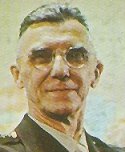With a passion for military history, I would like to see more forums like this and eagerly wait to read future responses. I believe Erwin (Johannes Eugen) Rommel was among the greatest battlefield general throughout world history. Although he also helped did revolutionize modern military warfare, Rommel was truly a military historian himself and frequently studied historical battles. While my selection of Rommel may not be “textbook commander,” I think his deception skills on the battlefield and how he incorporated this in his combat strategies were likely second to none. In fact, he was nicknamed the Desert Fox by both his friends and enemies, because he constantly improvised and used tricks in order to outsmart his enemies. Also at the same time, I might add that Rommel was promoted to the rank of Field Marshal. Rommel was the youngest German Field Marshal ever, since he received the promotion at the age of 50. As to his credits in deception, I would like to point to two examples. One example of his brilliance that I will illustrate is how Rommel successfully use anti-aircraft guns against tanks. From mid April to mid June, the British launched small-scale offensives but were forced to retreat to defensive positions by 88mm Flak (anti-aircraft) guns deployed as anti-tank guns. Here, Erwin Rommel deployed and dug in his 88mm Flak guns in the U-shaped formation. They were dug in so deep, that the barrel looked only 30 to 60cm over the ground level. They were dug in because they had no wheels and stood very high on large pods and had a high profile. Then a low tent was erected over the position of every gun and even with field glasses it was impossible to distinguish them from sand dunes. Since the British saw a lot of sand dunes, they were not disturbed by them as well as that they didn't know of any German weapon with the profile as low as the small sand dunes. Then Rommel sent his light tanks to fake an attack on British positions. The British Crusaders saw an easy prey and followed Panzers to attack, while Panzers withdraw in the U-shape. At point-blank range, sometimes requiring nerves of steel for the 88mm Flak gun crews, the trap sprang and they opened fire. My second example of his brilliant deception strategies come to light when Rommel ordered his troops to attach bundles of wood and bushes on long ropes to all the supply trucks and some Italian light tanks. The Italian light tanks drove in the first line, one after the other, behind them all the supply trucks. The attached bundles of wood and bushes made immense clouds of dust. For the British, it looked like the real full-scale attack. The Brits not only withdraw, but also turned their delaying forces in the wrong direction. At the same time, Rommel attacked from the other direction with his German Panzer Division. The British were completely outwitted and defeated. Although I could illustrate example after example, I think Erwin (Johannes Eugen) Rommel – “Der Wustenfuchs” – was another among the greatest military strategist on the battlefield.





